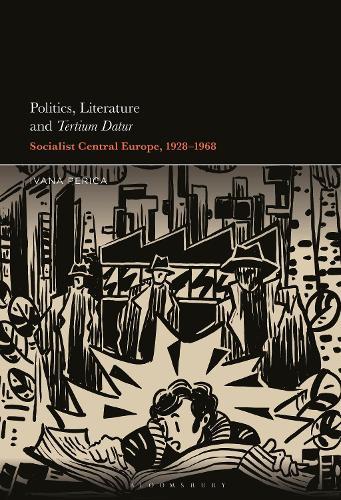Overview
Offers an alternate framing of the literary and political afterlives of revolution between 1928-1968 in Eastern and Western Europe. Politics, Literature and Tertium Datur combines the transfer of ideas between historical turning points with a comparative reading of political literatures in the European East and West to address the disparity between the abundance of scholarly accounts of 1968 and the simultaneous forgetting of developments in the interwar period that peaked around 1928. It deepens scholarly awareness of the transnational spaces of interwar literature and explores their afterlives in the post-World War II period. The book troubles and corrects Western European theories of 1968 by tracing the post-war afterlives of shared interwar experiences that point towards a socialist third way, or Georg Lukács’ tertium datur, and thus out of the conventionally understood East-West binary. It testifies to the existence of a literature that throughout the last century self-consciously oscillated between the exigencies of organized politics and the aesthetic task of helping to shape the humanity of tomorrow. Examining case studies of works by Bertolt Brecht, Ivan Olbracht and August Cesarec among others, Politics, Literature and Tertium Datur excavates a series of problems, optics and styles characteristic of the forgotten episodes of 20th-century literary history. It shows that the proverbial Iron Curtain was not impenetrable, and that the walls and borders erected in the post-war period could not completely suppress the reverberations and revival of projects that flourished in the political-literary metropolises of the interwar period.
Full Product Details
Author: Dr. Ivana Perica (Leibniz Center for Literary and Cultural Research, Germany)
Publisher: Bloomsbury Publishing Plc
Imprint: Bloomsbury Academic USA
Dimensions:
Width: 15.00cm
, Height: 2.20cm
, Length: 23.40cm
Weight: 0.580kg
ISBN: 9798765123928
Pages: 304
Publication Date: 18 September 2025
Audience:
Professional and scholarly
,
Professional & Vocational
Format: Hardback
Publisher's Status: Active
Availability: Manufactured on demand 
We will order this item for you from a manufactured on demand supplier.
Table of Contents
Introduction PART I: The contemporary r/evolutionary stalemate 1. What’s in a name? Political literature and the politics of literature 2. Tropes of conflict and disagreement: Interwar metaphors, post-war metonymies PART II: Nodal point ‘1928’ 3. The interwar r/evolutionary controversy 4. ‘To marry art to the people’: The Viennese hybridity · Revolutionary pulp fiction: Ernst Fischer's Lenin (1928) and Der große Verrat (The Great Treason, 1950) 5. ‘Literature, too, is a war zone’: Berlin’s literary communism · The negotiation play: Bertolt Brecht’s Die Maßnahme (The Measures Taken, 1930/1931) 6. Freedom of art but partisanship of artists: Interwar Prague · Male capital and its female provinces: Ivan Olbracht’s O Anne, rusé prolétarce (About Anna, the Red Proletarian, 1925–1926/1928) 7. The ‘social literature swindlers’ of Zagreb and Belgrade · A tableau of exiles: August Cesarec’s Bjegunci (The Fugitives, 1933) PART III: Nodal point ‘1968’ 8. Cultural revolutions in West, East and in-between: tertium datur? 9. Individualistic anarchism as the vanishing point of the 1968 cultural revolution · The dialectics of and yet: Peter Weiss’s Die Ästhetik des Widerstands (The Aesthetics of Resistance, 1971–1981) 10. Socialism with a human face but without socialist literature? Political and literary dissent around the Prague Spring · Josef Škvorecký’s precursory cynicism: Konec nylonového veku (The End of the Nylon Age, 1967) and Mirákl (The Miracle Game, 1972) 11. ‘Traditions and Perspectives’ of Yugoslav 1968 · ‘The tragic Tartuffe-like existence of the revolutionary’: Ervin Šinko’s Optimisták (The Optimists, 1954) and Roman jednog romana: Moskovski dnevnik (The Novel of a Novel: Abridged Diary Entries from Moscow, 1935–1937, 1955) 12. A r/evolutionary synthesis: Georg Lukács’s Die Eigenart des Ästhetischen (The Specificity of the Aesthetic, 1963) Bibliography Index
Reviews
Meandering between Berlin, Prague, Vienna, Zagreb and Belgrade, Perica’s rich and erudite study seeks a third way beyond the dilemmas of revolution and evolution that shaped leftist writing in Central Europe. This is a compelling contribution, always alert to the political stakes in reconstructing past debates, with their attendant frustrations and hopes. * Galin Tihanov, George Steiner Professor of Comparative Literature, Queen Mary University of London, UK *
Author Information
Ivana Perica is a research fellow at the Leibniz Centre for Literary and Cultural Research (Zfl) in Berlin, Germany. She is co-editor of The Political Uses of Literature: Global Perspectives and Theoretical Approaches, 1920-2020 (Bloombsury, 2024) and author of Die privat-öffentliche Achse des Politischen: Das Unvernehmen zwischen Hannah Arendt und Jacques Rancière (2016).
Tab Content 6
Author Website:
Countries Available
All regions
|



